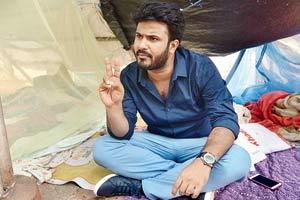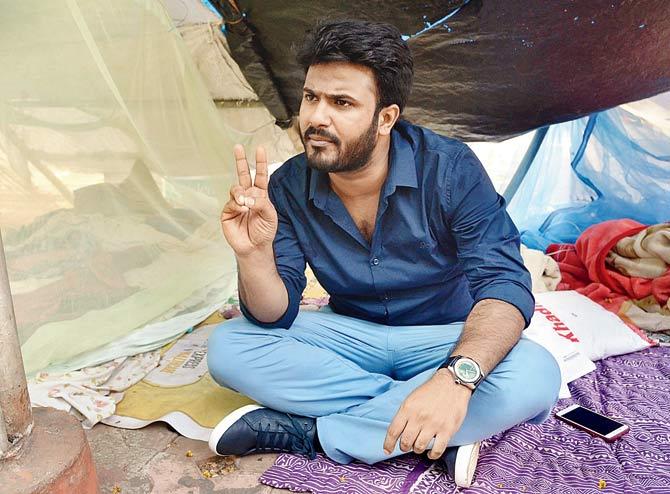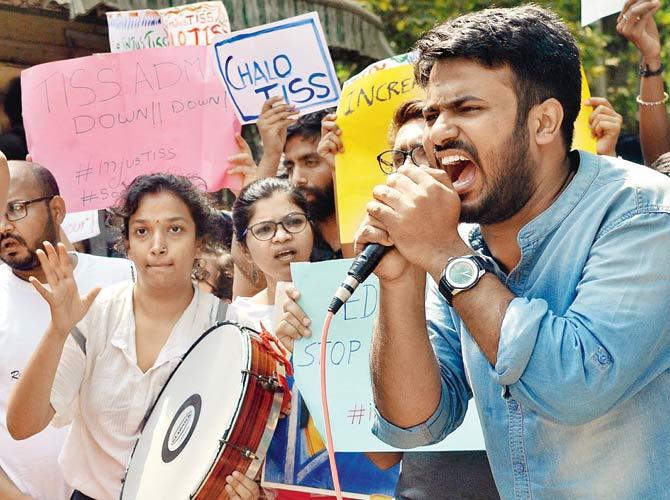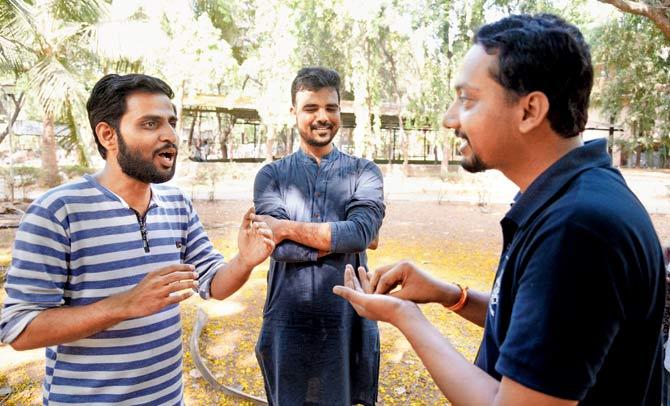Meet the students who are redefining student activism at two of the city's leading educational institutions


Fahad Ahmad, general secretary of the students’ union at TISS has been spending his nights in a makeshift tent at the protesting site of the campus. Pic/Datta Kumbhar
It's been over 50 days of slaving away for Fahad Ahmad, general secretary of the students' union at Tata Institute of Social Sciences (TISS). Amid leading the protest over the withdrawal of financial aid for SCs and STs, which began on February 21, Ahmad also submitted his thesis on the Muzaffarnagar Riots of 2013 as part of his MPhil.
The day he agrees to meet us at the protesting chamber inside the campus, he has a string of things to be done, including a viva test that would mark the completion of his course, and a train to catch to New Delhi. In the capital, there are a slew of appointments waiting to happen: While the chairperson of the National Commission for Scheduled Tribes has called him for a sitting on the issue, Ahmad has also requested for an appointment with the President of India, Ram Nath Kovind, which, he says, is most likely to happen through his contacts at his alma mater Aligarh Muslim University. "I have my hands full," the 25-year-old admits.

Ahmad has been spearheading the TISS protest on his own, after other members of the students’ union called off the strike
A lone fighter
Despite being part of the students' union, Ahmad has been fighting a lone battle, especially after majority of the members of the student union called off the strike within five days. While he doesn't hold any grudges against his colleagues, what appalls him is how he lost favour with the administration. "They have been getting very personal with me and have made me a soft target," he says. "Recently, when the Ministry of Human Resource Development came to the campus for a meeting, I wasn't allowed to talk. They [the administration] also issued memos and a legal notice against me and dragged us to court. What have I done to deserve such treatment?" asks Ahmad, who sits in a makeshift netted tent inside the protesting site, where he has been spending many sleepless nights. "But, I won't let them live peacefully till our demands are fulfilled," he says.

The student activists at MU support different ideologies, which often leads to clashes. (From left)âu00c2u0080u00c2u0088Rameshwar Shere of SFI, and Ravi Jaiswal and Amit Sharma of ABVP, discuss campus politics. Pic/Shadab Khan
Ahmad informs that the students' union decided to go on strike after talks regarding the sudden withdrawal of financial aid for students of two batches - 2016-18 and 2017-19 - from the SC and ST community, had failed. While the administration agreed to comply with this request, they maintained that the upcoming batches would have to pay the entire fee. "But, this fight is for the future generation, as much as it is for us," he says. He points out that after financial aid for the OBC had been scrapped at TISS in 2015, there has been a five per cent drop in the number of students applying from this community. "That proves how important this aid is for marginalised sections," he says.
Ahmad blames the "lack of political vibrancy" among students as the root cause of the problem. "I've come from an institution [Aligarh Muslim University], where campus politics was very vibrant. Here, the administration has reduced us [the students' union] to a PR agency that is tasked with holding cultural and literary festivals. This approach is pathetic. The kind of environment they have made here is stifling," he adds.
He doesn't get rattled by the criticism, especially when accused of having political motivations. "Yes, my fight is purely political, but I don't believe in supporting any particular political party. Instead, I feel there is a need for political assertion. The youth is going through an undeclared emergency, and the student community is in a huge crisis. We try and raise our voice and the government crushes you," says Ahmed, adding, "But, if you have to stop a peaceful protest, you have to first challenge democracy."
Campus politics
Nearly 10 km from TISS, at the Kalina campus of the University of Mumbai (MU), the problems raised by student activists aren't very different. Only here, student organisations are leading the front. The brutal murder of student activist Owen D'Souza in 1989, prompted the state to ban elections to the student council in 1993. "We do have a council now, but the students are selected by the administrators. This dilutes the democratic process," says Ravi Jaiswal, 27, Mumbai secretary of the Akhil Bharatiya Vidyarthi Parishad (ABVP), an all-India nationalist student organisation, which was founded in 1948 and shares its ideology with Rashtriya Swayamsevak Sangh (RSS).
Jaiswal is joined by co-worker Amit Sharma, 31, who has just completed his PhD in Hindi and rival, Rameshwar Shere, 28, Mumbai secretary of the Student Federation of India (SFI) that follows the socialist line of thought. While ABVP is a well represented unit - it registered 32,000 members last year, the SFI comprises 2,000 members. From the onset, the ideological differences are apparent. The issues that Jaiswal and Shere discuss are similar - the on-screen marking system and examination (OSM) mess, arbitrary fee hikes, scholarships not being disbursed, appointment of vice-chancellor - but the approach is starkly different. Shere's heart goes out to students of the SC/ST community, and how they are likely to be affected if MU becomes an autonomous body. "Fees will spiral, and they will no longer be able to afford their basic Right to Education," he says. His argument is countered by Jaiswal, who as a child was a member of the RSS, before joining ABVP, while pursuing FYBCom at National College, Bandra. "Why do we always need to talk about caste? Why can't we see the students' problem as a whole?" Jaiswal asks. "It's easy for you to say, because you have support from the government," Shere tells Jaiswal, who dismisses it as "a figment of his imagination".
Earlier in February, members of the SFI had held a demonstration against the ABVP alleging that their student members were attacked by the right-wing body in Pune. Shere brings it up, and the discussion threatens to get ugly as accusations are made by the two bickering organisations. But, when nudged, they do admit that if push comes to shove, they would stand together. "At the end of the day, we are fighting for a common cause - the student comes first," says Shere, who is pursuing a diploma in journalism from MU's Garware Institute of Career Education and Development.
Both groups believe that demonstrations and rallying are the way forward. What they get in return is futile assurances from the administration. Unlike Ahmad, they don't criticise the University for high-handed treatment. "But, very little work is being done," says Jaiswal, who takes credit for the ouster of vice-chancellor Sanjay Deshmukh. "The OSM was a big mess, and affected the lives of many students," adds Jaiswal, who just completed his LLM at GJ Advani College, Bandra.
What's, however, keeping the two organisations' hopes up is the comeback of the students' union elections this year, after nearly 25 years, under the Maharashtra Public Universities Act. Sharma, who has been witness to the political activism at Jawaharlal Nehru University in New Delhi, during a brief stay there, feels it will bring all the warring factions together. Like Ahmad says, "The need of the hour is for all students to come under one colour, because working in different groups won't help us fight fascist forces, who challenge our democratic spaces of learning."
Catch up on all the latest Mumbai news, crime news, current affairs, and also a complete guide on Mumbai from food to things to do and events across the city here. Also download the new mid-day Android and iOS apps to get latest updates
 Subscribe today by clicking the link and stay updated with the latest news!" Click here!
Subscribe today by clicking the link and stay updated with the latest news!" Click here!









